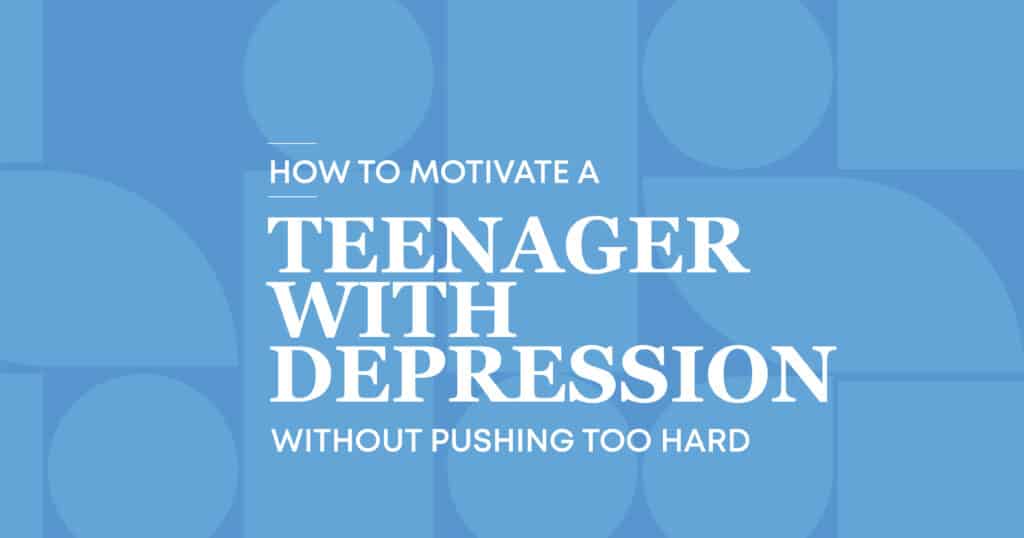Trying to support a teenager who’s struggling with depression is tough. Knowing the right thing to say or do can feel like walking a tightrope. The usual motivational pep talks can backfire. What’s needed is showing up in quiet, steady ways.
The goal isn’t to push them into feeling better. It’s more about gently encouraging them without piling on guilt or pressure. You want to give them space, but not abandon them. It might sound tricky, but it’s possible.
This guide is going to walk you through how to motivate a teenager with depression. You’ll also learn how to notice subtle signs of childhood depression and find out what to say, and what to avoid, when the going gets heavy.
Understanding Depression in Teenagers
Depression is a serious, diagnosable condition that rewires how they feel, think, act, and even how they see themselves.
Research says that roughly one out of every six teens will deal with depression before they become adults. That’s not a small number.
So if your teen starts acting “different,” maybe they’re zoning out at dinner, dropping grades, or ditching activities they used to enjoy, it’s not “just a phase.” It could be something deeper. And it matters that you notice.
The truth is, when it comes to depression in children, timing is everything. The earlier they get help, the better their chances of real recovery.
How It Differs From Typical Teen Moodiness
Now, to be fair, teens are emotional rollercoasters by nature. One minute they’re fine, the next, chaos. That said, there’s a line between normal mood swings and depression in teens that’s deeper, darker, and harder to snap out of.
Here’s how the two compare:
| Typical Teen Moodiness | Teen Depression |
| Mood swings after specific triggers (like a breakup or a bad grade) | Persistent low mood or irritability that sticks around |
| Sometimes withdraws from others | Consistently avoids family and friends |
| Annoyed or angry now and then | Talks about worthlessness or feels like a burden |
| Rebounds after some sleep or fun | Feels drained all the time, even with rest |
If these kinds of behaviors last a while and seem to be messing up daily life, school, friendships and hygiene, it’s time to take them seriously.
Why Motivation Looks Different When a Teen Is Depressed
Motivating a teen who’s depressed isn’t like dealing with a teen who’s just feeling lazy. Depression messes with brain chemistry. Things that should be simple- getting out of bed, texting back, brushing teeth start to feel absolutely overwhelming. Their energy is drained, their self-worth tanks, and even fun things can feel empty.
To put this into context, saying “Finish your homework and then you can go out” might work on a regular teen. But with depression? That’s not just ineffective, it’s exhausting for them.
What actually helps?
- Celebrate small wins. Getting out of bed without a fight deserves a “Hey, I saw that. Good job.” It might seem small to you, but to them, it’s huge. Just try not to overdo the praise, you don’t want it to feel fake.
- Set tiny goals. Baby steps make mountains manageable.
- Cut the pressure. Pressure equates stress, and stress just deepens the hole they’re in. Be there without hovering. Let them know they’re not alone in this, but don’t expect magic overnight.
Spotting the Signs and Symptoms of Teenage Depression
The signs and symptoms of depression aren’t always obvious, which is frustrating. But some signs stand out, especially when they start stacking up.
Here are a few red flags that something deeper might be going on:
- Feeling down a lot, crying without clear reasons
- Snapping over small stuff, irritable mood
- Losing interest in friends, hobbies, or things they used to love
- Eating way more or way less than usual
- Constantly low on energy or complaining about being tired
- Trouble focusing, zoning out often
- Harsh self-criticism or guilt
- Saying things like “I wish I didn’t exist” or even joking about death
The toughest part is: they might never say they’re depressed. But actions speak volumes. If several of these signs stick around for a couple of weeks, or they seem to be getting worse, don’t wait. It’s time to talk.
What Not to Say to a Teen Struggling With Depression
Your words carry a lot of weight, even when you don’t mean for them to. Saying the wrong thing can shut down conversation fast. Some things, even when meant kindly, just don’t land the right way.
Here’s a simple breakdown:
| What Not to Say | Better Alternatives |
| “Just get over it.” | “I’m here for you, even if I don’t get it yet.” |
| “You’ve got nothing to be sad about.” | “It’s okay to feel what you feel. I want to understand.” |
| “Others have it worse.” | “Your pain matters. It’s valid.” |
| “You’re being dramatic.” | “Sounds like it’s really hard right now. Want to talk?” |
You don’t have to have all the answers. In fact, it’s better if you don’t pretend to. Let your teen know they’re allowed to feel what they feel. That’s the first step toward healing.
And one more thing not to say to a depressed teenager includes sarcasm, minimizing their struggles, or using shame. Validation is key.
The Role of Routine, Sleep, and Movement in Mental Health
Even a little movement, a more regular bedtime, or having some kind of rhythm to the day, those can make a difference.
Let’s keep it super real:
- Sleep. Teens need way more sleep than they usually get—8 to 10 hours, ideally. Not just on weekends. A consistent sleep-wake cycle helps with mood regulation. Try to keep bedtimes somewhat steady, even if they don’t love it.
- Movement. You don’t need to enroll them in CrossFit. A short walk, some light stretching, kicking a ball around, these get the blood moving and clear the mental fog. Depression often makes people feel “stuck,” so a little motion helps.
- Routine. This one is underrated. Depression thrives in chaos. A simple routine adds some structure, even if it’s loose. It says, “Here’s something I can count on.”
Here’s an example day for a teen dealing with depression:
| Time | Activity |
| 8:00 AM | Wake up, eat a simple breakfast |
| 9:00 AM | Stretch, take a quick walk outside |
| 10:00 AM | Light schoolwork or drawing/music |
| 12:00 PM | Lunch |
| 1:00 PM | Free time (TV, chatting, chill games) |
| 3:00 PM | Journaling, light physical movement |
| 6:00 PM | Dinner with family |
| 8:00 PM | Quiet activity (reading, low-stress show) |
| 10:00 PM | Bedtime |
The point isn’t to micromanage their day. It’s to give them a gentle rhythm. Something to lean on when everything else feels heavy.
When to Seek Outside Help for Your Teen
Depression isn’t always something you can fix at home. And that’s okay. Sometimes love looks like knowing when to call in extra support.
Here are some clear signs that it’s time to reach out for help:
- Symptoms that don’t go away after a few weeks
- Mention of self-harm, suicide, or hopelessness
- Total social withdrawal (like, they barely leave their room)
- School performance is crashing fast
- They’re using drugs or alcohol to cope
Therapy isn’t giving up. Not even close. It’s giving your teen tools that you alone can’t provide. Professionals know how to walk them through this without judgment. Some offer family sessions too, which can be helpful if you’re feeling lost or overwhelmed.
If you’re wondering how to help youth with depression, therapy is a huge piece of the puzzle. You’re not handing your child off, you’re teaming up with someone who can offer insight, skills, and structured support.
Looking for Support? Hillside Horizon for Teens Is Here to Help
You’re trying to be strong for your teen, maybe for your whole family, and at the same time, you’re questioning whether you’re even doing enough. That’s normal. You’re not failing, you’re just human.
At Hillside Horizon for Teens, we specialize in helping teens navigate stuff like childhood depression, anxiety, trauma, and just the overall messiness of growing up. Our programs aren’t one-size-fits-all, and we never take a cookie-cutter approach.
Whether your teen needs regular outpatient counseling, an intensive treatment plan, or just someone who gets them and doesn’t dismiss their pain, we’re here.
You don’t have to carry this alone. You really don’t. Contact Hillside Horizon for Teens when you’re ready. Let’s figure this out, together.
FAQs
How do I motivate a teenager with depression?
The best way is to go gently and avoid pushing too hard. Focus on small steps and quiet encouragement instead of pressure. Let them know you’re proud of them just for trying.
What are the signs of depression in teens?
Look for things like constant tiredness, pulling away from friends, sudden changes in eating or sleeping, or losing interest in stuff they used to enjoy. They might also seem unusually irritable or say really negative things about themselves.
What should I avoid saying to a depressed teen?
Avoid phrases like “just get over it” or “others have it worse”. They usually do more harm than good. Instead, try saying things like “I’m here for you” or “I may not understand everything, but I care.” Validating their feelings helps way more than trying to fix them.
Can therapy help teenagers with depression?
Yes, therapy can be incredibly helpful. It gives them a safe space to talk and helps them understand what they’re feeling. A good therapist can also teach coping skills that actually work for their specific situation.
What lifestyle changes improve teenage depression?
Getting better sleep, eating more regularly, and moving their body, even just a little, can really make a difference. A simple routine can help them feel a little more in control.




